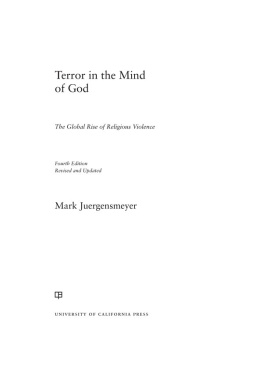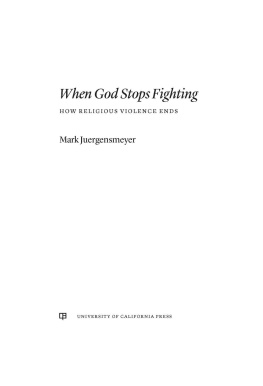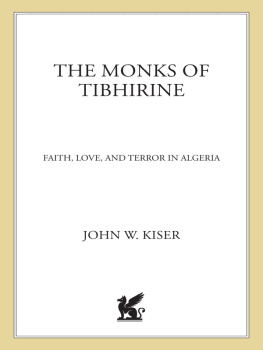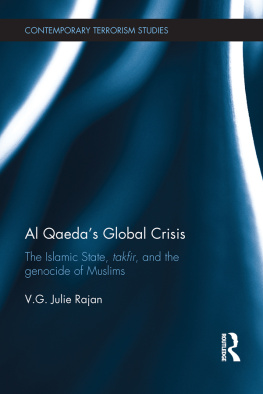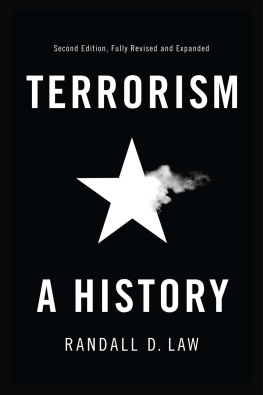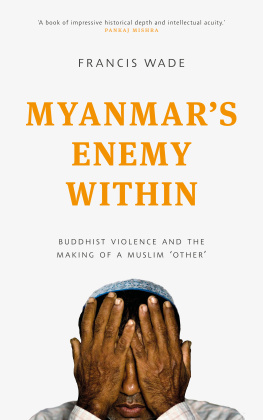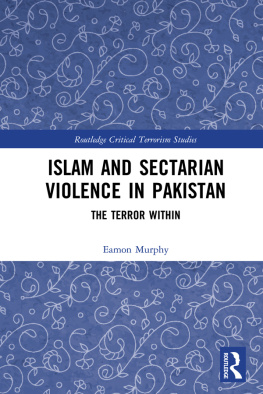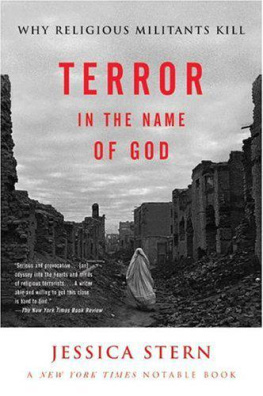COMPARATIVE STUDIES IN RELIGION AND SOCIETY
Mark Juergensmeyer, editor
Redemptive Encounters: Three Modern Styles in the Hindu Tradition, by Lawrence Babb
Saints and Virtues, edited by John Stratton Hawley
Utopias in Conflict: Religion and Nationalism in Modern India, by Ainslee T. Embree
Mama Lola: A Vodou Priestess in Brooklyn, by Karen McCarthy Brown
The New Cold War? Religious Nationalism Confronts the Secular State, by Mark Juergensmeyer
Pious Passion: The Emergence of Modern Fundamentalism in the United States and Iran, by Martin Riesebrodt, translated by Don Reneau
Devi: Goddess of India, edited by John Stratton Hawley and Donna Marie Wulff
Absent Lord: Ascetics and Kings in a Jain Ritual Culture, by Lawrence A. Babb
The Challenge of Fundamentalism: Political Islam and the New World Disorder, by Bassam Tibi
Levelling Crowds: Ethno-nationalist Conflicts and Collective Violence in South Asia, by Stanley J. Tambiah
The Bridge Betrayed: Religion and Genocide in Bosnia, by Michael A. Sells
Chinas Catholics: Tragedy and Hope in an Emerging Civil Society, by Richard Madsen
Terror in the Mind of God: The Global Rise of Religious Violence, by Mark Juergensmeyer
Imagining Karma: Ethical Transformation in Amerindian, Buddhist, and Greek Rebirth, by Gananath Obeyesekere
A Culture of Conspiracy: Apocalyptic Visions in Contemporary America, by Michael Barkun
Global Rebellion: Religious Challenges to the Secular State, by Mark Juergensmeyer
Terror in the Mind of God
The Global Rise of Religious Violence
Fourth Edition
Revised and Updated
Mark Juergensmeyer

UNIVERSITY OF CALIFORNIA PRESS
University of California Press, one of the most distinguished university presses in the United States, enriches lives around the world by advancing scholarship in the humanities, social sciences, and natural sciences. Its activities are supported by the UC Press Foundation and by philanthropic contributions from individuals and institutions. For more information, visit www.ucpress.edu.
University of California Press
Oakland, California
2017 by The Regents of the University of California
Library of Congress Cataloging-in-Publication Data
Names: Juergensmeyer, Mark, author.
Title: Terror in the mind of god : the global rise of religious violence / revised and updated Mark Juergensmeyer.
Other titles: Comparative studies in religion and society ; 13.
Description: Fourth edition. | Oakland, California : University of California Press, [2017] | Series: Comparative studies in religion and society ; 13 | Includes bibliographical references and index.
Identifiers: LCCN 2016040508 (print) | LCCN 2016042080 (ebook) | ISBN 9780520291355 (pbk. : alk. paper) | ISBN 9780520965164 (eBooks)
Subjects: LCSH : ViolenceReligious aspects.
Classification: LCC BL 65. V 55 J 84 2017 (print) | LCC BL 65. V 55 (ebook) | DDC 205/.697dc23
LC record available at https://lccn.loc.gov/2016040508
Manufactured in the United States of America
24 23 22 21 20 19 18 17
10 9 8 7 6 5 4 3 2 1
To terrors victims
I will send my terror before you,
and will throw into confusion all the people...
Exodus 23:27
Contents
Preface and Acknowledgments
I am sometimes asked why a nice guy like me would want to study religious terrorism. Those who ask this question usually brush the intellectual explanations asideas if my interest in the global dimensions of religion and society werent reason enough. They search for something more personal.
One answer I give is that my work on nationalism and global conflict has led to a concern about areas of the world where social transformations have not been easy, and where peaceful options have shredded into violence. I have seen the unraveling of social order close at hand, having lived for a time in Indias Punjab, a region torn apart by spiraling violence between militant Sikhs and the Indian government. With the horrors of that era of terror in mind, I have gone to troubled places elsewhere to understand how civil order can collapse, and to search for patterns in the relationship of religion and violence around the world.
Yet another answer is more personal still. As someone who was raised in the religious milieu of Midwestern Protestantism, I know the power of religion to provide a transformative vision of the human potential. In my experience this transformative quality of religion has been a positive thingit has been associated with images of personal wholeness and social redemptionand it has mostly been nonviolent. I say mostly because I can remember moments from my own religious involvement in civil rights and antiwar movements a generation ago that were dangerously confrontational and occasionally bloody. So I feel a certain kinship with present-day religious activists who take religion seriously, and I wonder if one of their motivations might be a spiritual conviction so strong that they are willing to kill and to be killed for moral reasons.
Yet my own social activism never reached such extremes, nor could I imagine a situation where even the most worthy of causes could justify taking another persons life. Thus I have looked for other motivations for those who have perpetrated acts of religious terrorism rather than simply struggling for a worthy cause. I have wondered why their views of religion and social engagement have taken such a lethal turn and why they have felt so justified in undertaking actions that have led to destruction and death, often committed in brutal and dramatic ways.
In seeking answers to these questions, I found myself looking not only at particular people and case studies, but also at the larger social and political changes that affect the globe at this moment of history and provide the context for many violent encounters. It is this theme that also runs through the book that is the companion to this volume, Global Rebellion: Religious Challenges to the Secular State, though here I focus on violent events rather than on activist movements. I have found that a study of this striking phenomenon can tell us something about religion, about public violence, and about the character of contemporary society on virtually a global scale.
In this book I explore this dark alliance between religion and violence. I have examined a variety of acts of religious terrorism over thirty years to try to understand the cultures of violence from which they emerge. Through my interviews with perpetrators and supporters I have come to see these acts as forms of public performance rather than aspects of political strategy. These are symbolic statements aimed at providing a sense of empowerment to desperate communities. The collapse of the twin towers of the World Trade Center on September 11, 2001, must have created a heady illusion of power to those who conspired to bring them down.
Religion is crucial for these acts, since it gives moral justifications for killing and provides images of cosmic war that allow activists to believe that they are waging spiritual scenarios. This does not mean that religion causes violencepolitical and social issues are usually at faultbut it does mean that religion can provide the mores and symbols that are associated with bloodshed, even catastrophic acts of terrorism. This is what I mean when I use the phrase religious violencenot violence caused by religion, but violence associated with it.
Violent ideas and images are not the monopoly of any single religion. Virtually every major religious traditionChristian, Jewish, Muslim, Hindu, Sikh, and Buddhisthas served as a resource for violent actors. Perhaps it is not fair to label Osama bin Laden a Muslim terrorist or to characterize Anders Breivik a Christian oneas if they were violent because of their Islamic and Christian beliefs. But the fact that religion is in their backgrounds, and behind so many different perpetrators of public violence, indicates that all religions are inherently revolutionary. They are capable of providing the ideological resources for an alternative view of public order.

